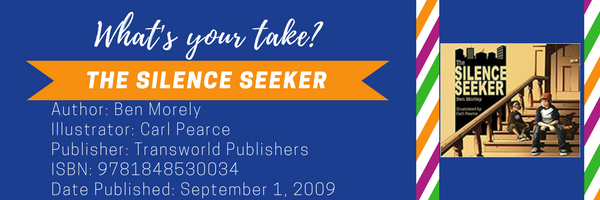We continue this month’s My Take Your Take theme of refugees with The Silence Seeker by Ben Morley and Carl Pearce. It is the story of a new friendship between a kind young boy and a refugee boy who has just moved in next door. This story promotes kindness and introduces a conversation to have with children about refugees in America.

Jessica: This simple, brightly-colored book is about an inner-city boy who is excited to play with his new neighbor. His mother mentions the boy next door is an “asylum seeker” looking for peace and quiet, but the boy misunderstands her. He believes his neighbor is a “silence seeker,” and as an act of kindness helps his new neighbor and shows him all of the quiet places in the city where he can find silence.
The two boys venture into the city and explore quiet places, but are disappointed to find noise in each location. Unsuccessful, the boys go home with smiles on their faces and the boy’s promise to try again the next day. When the boy wakes up, his new neighbor has left. He believes his neighbor left because he couldn’t find silence in the city, and wishes that he finds silence wherever he goes.
There is a play on noise and silence throughout the story. The young boy never notices how noisy the city is until he tries to find silence for his new neighbor. The neighbor never speaks a word throughout the book. Does he ever understand what the young boy does for him, or does he simply follow him and enjoy exploring the city with his new friend?
We never know if the new neighbor understands English, or if he is too shy (or scared) to speak. Either way, the neighbor takes the young boy’s hand and smiles. This shows they have some sort of understanding, even if it it only the acceptance of kindness. The terminology used by the boy to describe people is humorous. The true-to-life descriptions and child-censored terminology give voice to this main character.
This book touches on a difficult subject from a child’s perspective, and perhaps the brilliance of this book is how it shows the mind of a child. Although this book does not provide information about refugees seeking asylum, it provides a great opportunity to open the conversation with students, to discuss the meaning of this book, especially what the mom tells her son at the beginning of the story, and to continue with a thoughtful conversation about refugees today.
Even though this book is simple in nature, it explains an important concept to understand once children have the foundational knowledge of a refugee. The story is non-threatening and displays innocent acts of kindness, which provides a gentle transfer of information about refugees.
Janelle: I first read The Silence Seeker at a conference in London years ago. The session topic was immigration, and I was drawn to this book because of the child’s misunderstanding of asylum seeker as the description of the new boy next door. Children’s interpretations of new words are always interesting, and they frequently make sense metaphorically. The child thinks his mother says “silence seeker” and decides to help the new boy find silence.
As they traverse the city, its liveliness has an artistic energy that the images and silence of the refugee lacks. We never know the boy’s story, his name, or what happens to him when he leaves with his family. The book ends with only a wish from the child that the boy finds the silence he is seeking.
Children that live near refugee children do not usually realize what brings these newcomers to their communities. They don’t know why they left their homes. Often the adults in these communities do not know either, except through media reports that offer the stories refugees bring. This book is powerful, but other books more openly tell the refugee story. Young readers realize that they can help, just like the child in The Silence Seeker, even if they do not know the background of the newcomer.
Gervelie’s Journey: A Refugee Diary by Anthony Robinson and Annemarie Young is from the point of view of a young girl who makes several stops in England before she reaches her new home. Other books in this month’s My Take, Your Take support The Silence Seeker, which is full of heartfelt care from the child but does not show why such care is important. It is critical to support children as they learn to support refugees in their community that are adapting to loss, challenges a new culture. To welcome these newcomers is simplistic but heartfelt.
Title: The Silence Seeker
Authors: Ben Morely and Carl Pearce
Publisher: Transworld Publishers
ISBN: 9781848530034
Date Published: September 1 2009
This is the second installment of November 2017’s My Take/Your Take. To follow these continuing conversations, check back every Wednesday.
- Themes: ben morely, carl pearce, Janelle Mathis, jessica edwards, Silence Seeker
- Descriptors: Books & Resources, My Take/Your Take
